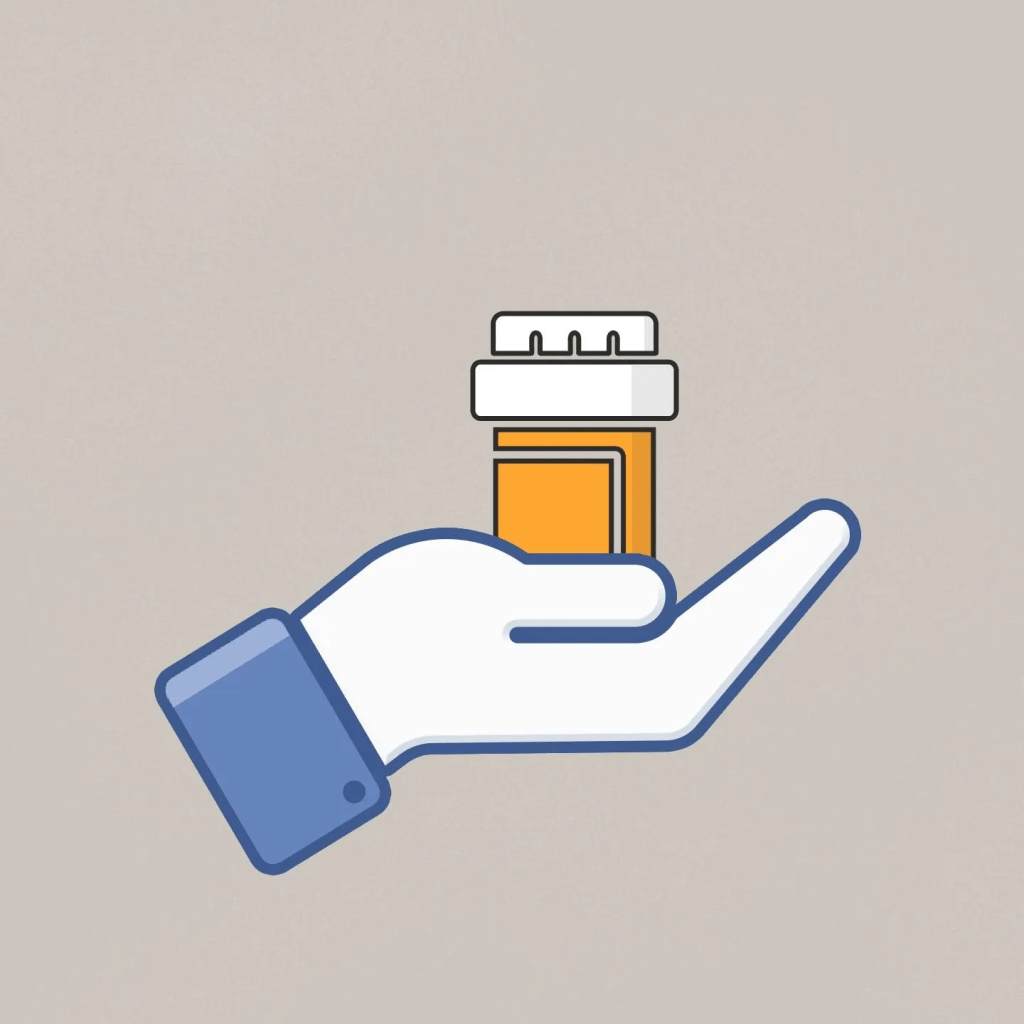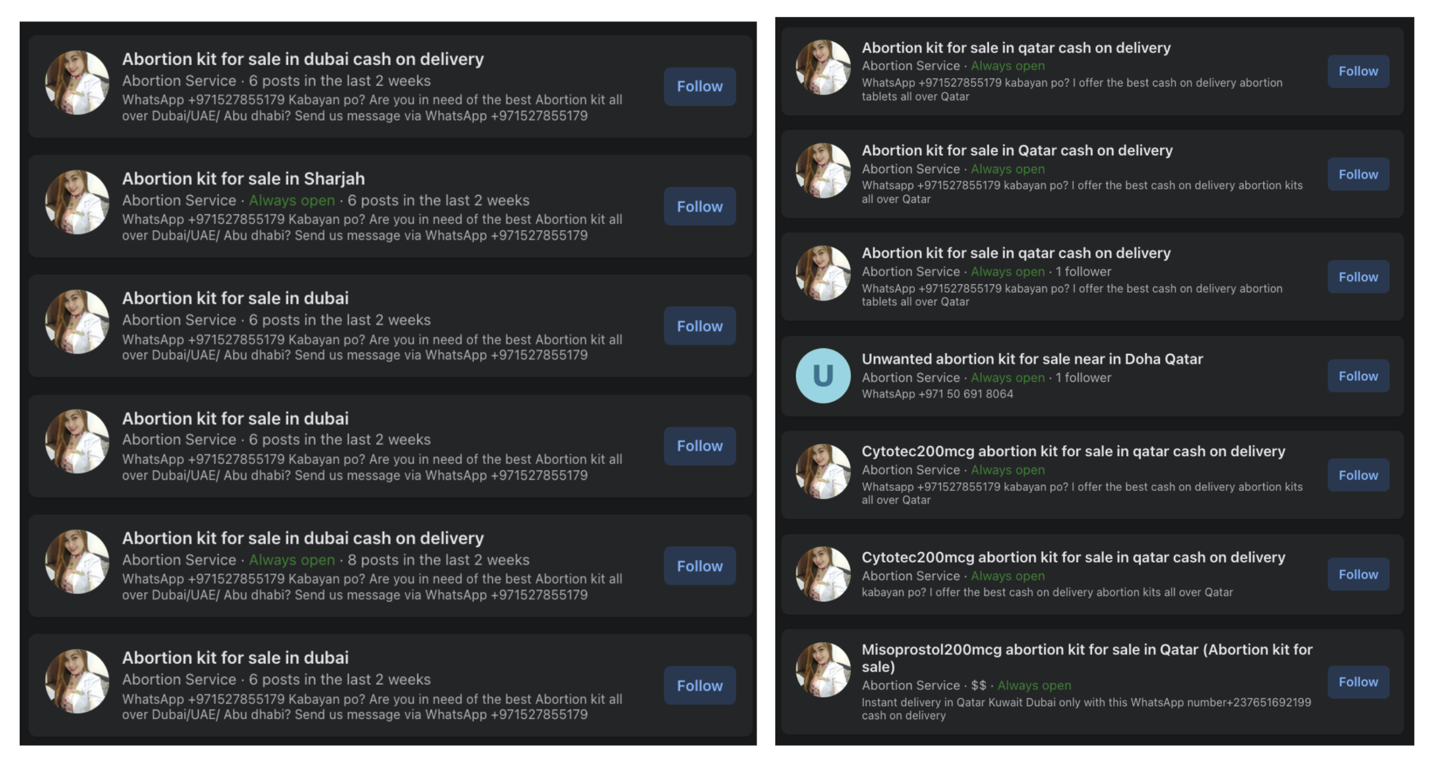In hundreds of groups across the social media app, women with unwanted pregnancies turn to one another for pills and herbal remedies. Many say they are getting scammed instead.

To a Facebook group of more than 8,000 strangers, Brazilian women plead for help.
“I’m 15 weeks pregnant I don’t know what to do anymore. I tried the medicine at 8 weeks and it went wrong,” says one message.
“I’m 9 weeks and 4 days pregnant. I’ve tried all the possible teas that I saw on the internet, and some of them really hurt. I already have two small children, and this one came from carelessness …. Time is passing and I am desperate,” says another.
A third woman says she cannot afford abortion medicine, so she’s seeking other remedies. A fourth says she spent the only money she had on a sale she now fears was a scam.
The group hosting these messages is called “Safe Abortion — Helping Women.” In Brazil, where abortion is illegal in most cases, nearly two hundred thousand women have joined similar groups devoted to buying and selling mifepristone, misoprostol and a variety of homemade remedies that they hope might terminate their unwanted pregnancies.
The groups are not for the faint of heart. Many feature photos of bloody sanitary pads and fetal solids, and many more feature cries for help from women fleeing abusive partners or fearing for the health of their existing children. Posts warning of scammers and fake pills are common, as are side-conversations about unprotected sex and contraception. Occasionally, a person opposed to abortion chimes in advising the women to consider adoption.
Brazil is one of many countries where women have turned to a muddied Facebook landscape to seek abortion care. A Forbes review of the platform found nearly 800 groups and pages across 76 countries offering to connect women to abortion remedies — at least 300 of which operate in countries where abortion is at least sometimes illegal, or even a criminal offence. All told, the groups have nearly 1.8 million members. Forbes found that Facebook groups and pages selling abortion drugs were present in nearly every major region around the world, including abortion-restrictive population centres like Brazil (111 groups; >191,000 members), Kenya (50 groups, >111,000 members) and the Philippines (57 groups; >37,000 members). We also found them in Iran, Iraq, Kazakhstan, Kyrgyzstan, Japan, Germany and Norway.
Seventeen groups and pages claimed to provide abortion pills to women in the United States, though it is unclear how many of them actually make the pills available. The largest, which has more than 117,000 members, directed users to an abortion-related URL that subsequently redirected to an adult website. The two admins for the group, one of whom sells live fowl in the Philippines from their Facebook profile, did not respond to interview requests. (Disclosure: In a previous life, I held content policy positions at Facebook and Spotify.)
Many of the groups have made use of a new Facebook feature that enables group members to post in groups as an “anonymous participant,” rather than under the name they use on Facebook. Of the group members selling, rather than seeking, drugs and remedies, many have taken other steps to disguise their identities — which, if revealed, could threaten their safety and liberty. One private group in Brazil listed 10 admins, all of whom used apparently AI-generated profile pictures and four who listed their surnames as “cyto” or “cito” — short for cytotec, the Pfizer brand for misoprostol. While some of the groups claim they are run by doctors, many are clearly not, and instead provide places for women to buy and sell pills and other products without a prescription.
Abortion bans don’t make people less likely to end a pregnancy, but they do make it harder for them to do so safely. Katy Mayall, the director for strategic initiatives at the Center for Reproductive Rights, told Forbes that there are reliable websites where people can learn how to self-manage abortion and order safe, authentic pills. (She recommended Women Help Women, Women on Web, and INeedAnA.com.) But the Facebook groups, she said, are something of a double edged sword: while they may get some women help, they can be a gateway to scams and fraudsters into the picture, and carry health and privacy risks for people in restrictive countries.
One risk for people in these groups is that Facebook could be required to share their personal information with law enforcement. In August 2022, after the United States Supreme Court made abortion illegal in dozens of US states, Facebook was required to turn over messages between a mother and daughter to Nebraska law enforcement officials, who used them as evidence in prosecution of the women for their purchase and use of abortion pills to terminate a pregnancy. The daughter subsequently pleaded guilty to a felony charge of removing, concealing or abandoning a dead human body, and the mother pled to that charge and an additional one: performing an abortion beyond 20 weeks.
After the U.S. Supreme Court decision, Facebook began removing groups, pages, and posts between women trying to buy and sell abortion drugs. But ongoing policing of that activity has been tricky for the platform: many of the groups no longer refer to the drugs by name, instead using euphemisms like “candy” and “caramelos.”
Facebook’s parent company, Meta, does allow businesses in some countries to run advertisements for prescription drugs, including mifepristone and misoprostol, as long as the ads are not targeted to people under the age of 18. Advertisers promoting prescription drugs must provide evidence to Meta that they are properly licensed to sell them and must receive pre-approval before running ads.
Meta does not prohibit women from talking about their experiences self-managing abortions on its platforms, and in the groups and pages reviewed by Forbes, it appears the actual sale of drugs rarely happens on Facebook itself. Instead, sellers typically direct potential buyers to contact them on WhatsApp, Meta’s encrypted chat service; “DM me for candies” is typical of this type of solicitation. When a person reaches out to the Whatsapp numbers posted in some of these groups, they’ll sometimes get an automated welcome message asking for details about where they are located and how far along their pregnancy is.
One provider quoted Forbes with a range of prices between $80 and $200 USD, for various purported drugs and remedies. Women on Web, one of the websites that Mayall recommended, offers combinations of mifepristone and misoprostol for between 70 and 90 euros, depending on the patient’s location.
When Forbes reached out to dozens of these numbers on WhatsApp, few responded after we identified ourselves as journalists. One provider we messaged said they were “saddened to see the death toll from abortion in women.” Another person whose number had been posted in the groups said they weren’t a provider, but they “receive messages every day asking for remedies.”
Meta spokesperson Ryan Daniels said in a statement, “We want our platforms to be a place where people can safely discuss the issues that matter to them, including topics around health. At the same time, we have specific rules and policies on buying, selling, or trading prescription drugs and protections to keep people safe from scammers, whether in health or other matters. We will take action against any pages and groups we find to violate our policies.”
In some groups, women ask and advise one another about how to end pregnancies with home remedies. While most of these remedies are harmless (though ineffective), some can lead to health problems. Several of the groups reviewed by Forbes contained advice recommending that women use a combination of over-the-counter medication and Coca Cola to end their pregnancies. The remedy does not cause abortion, but can cause vaginal infections and other health problems.
The groups are also filled with warnings about various Facebook profiles that either take money for pills they never deliver, or deliver medicine that is fake. One account — an admin of several groups in Brazil — made a series of formulaic posts that appeared to recycle the same desperate story of an eighteen year old woman seeking help as part of a scaled effort to reach other women in need.
In addition to claims of one-off scammers, Forbes also found evidence of larger, more coordinated efforts to reach — and potentially deceive — women seeking care. In Qatar, the United Arab Emirates, Canada, and other locations, a network of several hundred pages offers “abortion kits” using the same set of profile pictures, descriptions and phone numbers.

Some of the groups and pages specifically sought out women with difficult abortion needs — like those who are 6, 7, or even 8 months pregnant. In a group for South Africa, where abortion is legal, one participant wrote: “I was 6 months! Now I’m free after being scammed 3 times don’t give up ladies.” Several other members of the group also mentioned having been repeatedly scammed, and ultimately terminating later-term pregnancies as a result.
Other groups speak specifically to teen girls who are not ready to become parents — dozens of posts made by a group admin identifying as a doctor promoted a Zimbabwean service to its more than 800 members: “Teens welcome & no parental consent.” The message was also included on the group’s “about” page. Abortion is only legal in the country in cases of rape, incest, when the pregnancy threatens the life or health of the pregnant person, or if the fetus is at risk of serious physical or mental defects.
Groups for buying and selling abortion remedies have also flourished in South Africa, which — unlike most other countries on the African continent — has broadly legalized abortion. Of the groups analyzed by Forbes, 142 offered services in the country, with many promising hand delivery of pills or herbal remedies.
A recent post in a 39,000-person South African group read: “Thank God I’m free but it’s painful guys.” A thread of comments followed beneath the post, where others asked what method the original poster used, how to get care for themselves, and how much it would cost. More than 30 comments down, one user questioned the premise of the group at all.
“Just so you know guys the pills are free in hospital and it’s safe.”
This article was originally published on forbes.com.

